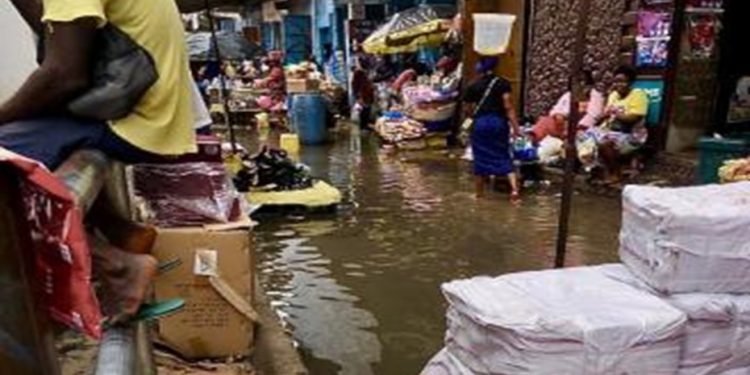By: Mohamed Dauda Kamara
Sierra Leonean.
Facebook user name: Mohammmed Dauda Kamara
Freetown, the capital city of Sierra Leone, is squeezed between hilltops and the peninsular mountains on the West African coastline, with approximately 1.2 million populations. It experiences above 3,500mm annual downpour of rains from May to October, stalling businesses and endangering livelihoods. But most times, due to climatic fluctuations, the Raining season will start in June and end in November, encroaching in the Dry Season with a brief-windy rain. Freetown is densely populated with informal settlements, highly prone to flood, landslide, erosion, tropical storms, deforestation, and sea-level rise. But what really happens during the rainy season?
Flooding associated with Improper Waste Management in Freetown
Mostly, when it rains heavily in Freetown, streets are flooded with smelly garbage due to improper waste management in the city. A report by Nationally Determined Contribution (NDC) revealed that Freetown generates at least 600 metric tons of waste per year or 219,000 metric tons of waste annually. Wastes/garbage are dumped in drainages and culverts, blocking storm water drains and causing water to overflow on streets and residence. During heavy rainfalls in Freetown, the risk of flooding is high due to the improper disposal of wastes in drains or culverts. Improper waste management also leads to environmental degradation, making the city more susceptible to flooding. In the raining season, flooding is more common in low-lying areas and areas with poor drainage systems. Market areas are mostly stormed by flood, causing traffic and destroying commodities.
Landslides in Freetown due to Improper Housing Structure and Deforestation.
Over the years, the city has experienced landslides in different communities during the rains, resulting in casualties and injuries. The most notable flooding and mudslide incident in the city, was on the 14th August, 2017, which led to the deaths of more than 1,000 people according to World Bank. Also, last year, there were also two cases of landslide in different parts of the city were recorded, which resulted in four casualties, according to a report by the country’s National Disaster Management. Houses built on hillside areas and mountains without any stringent deforestation actions, often lead to soil erosion and the sloping of soil during the rains. Sometimes, days of nonstop rains can also cause damages to homes, induce fatal accidents and injuries, call off appointments, and restricts citizens from going out.
An Influx of foul-smelling seaweed smothers Freetown’s Beaches in the Rainy Season
During the raining season in Freetown, an influx of brown rotten seaweeds scatters over the white-sand beaches, acting as a setback to tourists’ attraction, clogging fishing boats, and hampering the fishing industry for fishermen and fishmongers. Residents have raised several complaints about these seaweeds, but it often disappears in the dry season after efforts by government officials to get rid of them. Freetown’s marine life, the fishing industry and tourism sector are mostly at threat in the raining season, inundated by the stench smell of seaweed and other environmental issues.
Despite the city is faced with several climate change issues, the rainy season still plays an active role in agriculture, helping crops to grow, and sustaining livestock. It helps to restore the natural beauty of the city, with fresh-looking green trees surrounding its environs. The government’s efforts to actively respond to disasters in the country, has pre-empted solutions to these environmental hazards this year, launching the Risk Disaster Management Plan, spanning from 2024 – 2029.













